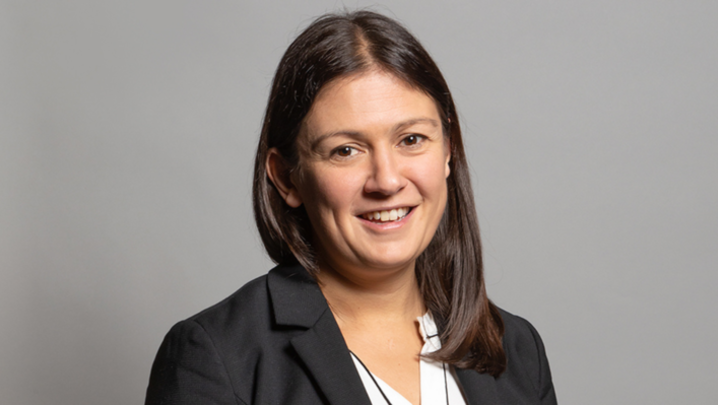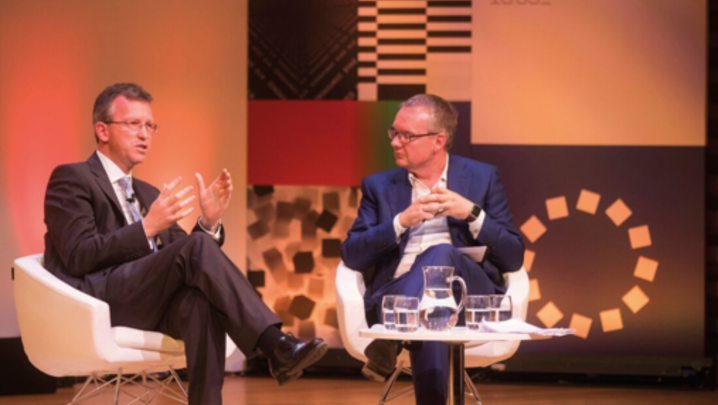Culture Secretary Lisa Nandy talks tough on the duty of broadcasters and producers to reflect our entire national story
For the first time in 15 years, a Labour Culture Secretary took to the stage at an RTS convention. Lisa Nandy, appointed in early July, mounted a passionate defence of public service broadcasting, telling broadcasters and streamers to be less London-centric – and giving a shout-out to beloved CBBC puppet Hacker T Dog, who hails from her own Wigan constituency.
She praised children’s TV for being “one of the things your industry and our country is brilliant at”.
Changing technology had led to a media revolution since Labour was last in power in 2010. “There is a choice ahead of us. Whether we choose to be the last guardians of this chapter, or the first pioneers of the next,” said the Culture Secretary.
“So today I’m laying out how our new Government will go about helping to create the conditions for this new era… And being clear about the change we need from you in return.”
There was praise for Channel 4 opening a regional HQ in Leeds, which had been “a gamechanger for West Yorkshire”, and the BBC’s move to Salford. But more needed to be done, she said, as she urged convention delegates to up their game in terms of their regional responsibilities and employing local people:
“For all the efforts made by many of you in this room, it should shame us all that television is one of the most centralised and exclusive industries in the UK, because who tells the story determines the story told.
“If you aren’t commissioning content from every part of the country – towns and villages as well as major cities – why not? If you bus people in rather than recruit locally, stop it. Talent is everywhere. Opportunity is not.
“And if you’ve moved jobs and people and content, but the heads of departments and commissioners are all still in an office in London, do something about it…”
Echoing James Graham’s much admired recent MacTaggart Lecture, in which the writer of Sherwood and Quiz called for greater working-class representation in British TV, Nandy highlighted the fact that only 8% of people who work in UK television are working class.
The Secretary of State praised Peaky Blinders creator Steven Knight’s determination to provide local youngsters in Birmingham with opportunities to work in the screen sector and recruit people from the most deprived communities and build affordable housing. That way they can walk to work. For him this is not just a passion, she said, it’s good business sense. Knight’s local workforce was an asset that attracts people. The Government was considering what more it can do to help “these incredible projects to succeed”.
"We will do everything we can to put rocket boosters under your efforts"
“He was at pains to tell me how much he benefits from the wider broadcasting ecosystem, particularly the BBC, whose investment in skills underpins so much that others are able to do,” she added.
The BBC’s future was the “most fundamental question facing us”. Its role in our national life cannot be filled elsewhere. “Every TV project I’ve visited as Culture Secretary has a contribution from the BBC behind it somewhere along the line, whether it’s content, training or commissioning.”
She continued: “For too long the BBC has been caught between the state and the market – with obligations that create an unlevel playing field but increasingly reliant on commercial income.”
On the key question of the licence fee’s future, Nandy said the government was committed to retaining it at a very minimum for the rest of this charter period, but acknowledged this method of funding the corporation was “increasingly challenging”.
“It’s my view that for too long ministers have patched this up, with pressure to commercialise sitting uneasily alongside the BBC’s ability to provide content for all audiences. And I believe that this is untenable.
“And that the importance of the obligations placed on the BBC – especially when it comes to the World Service - shows the vital need for sustainable public funding.The next charter review has to ensure the BBC doesn’t just survive but thrives for decades to come.”
In recent weeks, she has raised the idea of the BBC being recast as a mutually owned entity on the lines of the original building societies and hinted at this idea in the following: “As part of that, the most important consideration is how to ensure the public feel ownership of their national broadcaster. That it belongs to and is responsive to them. That it enriches their lives, wherever they live and whatever their background. A truly national broadcaster in which all of us have a stake.”
Regarding UK public service broadcasting per se, the new minister was unequivocally positive and contrasted her view with recent Conservative administrations.
“We believe in public service broadcasting. For too long, the Tories came to conferences like this and talked about recognising the value of public service broadcasters, while undermining trust, assaulting credibility and sowing uncertainty. Our Government will be different.”
But public service involved reflecting all parts of the UK. “Frankly, if you don’t know why the film industry is so attracted to the beauty of Sunderland, or why the arts sector is buzzing in Bradford, or the potential to TV of the Welsh valleys, it’s most likely because you’ve never been there,” stressed Nandy. “And you have no right to call yourself a public service broadcaster. Because public service means serving the whole people, recognising their contribution and reflecting them in our national story.”
Nandy’s mother was Head of News at Granada Television, working under her maiden name, Luise Byers. Her stepfather was RTS award-winning investigative journalist Ray Fitzwalter. But today’s news environment could not be more different from her parents’ era with the increasing dominance of social media platforms.

“Profound changes to how and where people get their news matter,” she noted. “When warring political tribes with separate news sources and information feeds construct their own realities it costs us dear, it costs us the ability to understand one another.
“We’ve seen how pernicious, unchecked disinformation fanned the flames of violence this summer in our towns and cities.”
If trust in the media was to be restored, broadcasters needed to be truthful, not neutral, she said, referencing CNN’s awarding-winning reporter Christiane Amanpour. “That is not just your right, but your duty. It is crucial to whether this country succeeds.
“Because without the ability to speak truth to power, to hold up a mirror to the way government operates, we will never remedy the catastrophic collapse of trust in politics itself, the only tool that working-class people in our country have ever had to create change,” said Nandy.
She highlighted the Department for Science, Innovation and Technology’s work tackling incitement and disinformation through the Online Safety Act.
The Media Act, passed during Rishi Sunak’s last days in power, brought important reforms to the regulation of television and radio services. This would ensure that, as the way we consume media changes, the landscape changes with them. Ofcom, set up by Tony Blair in 2002, would start implementing the Act immediately.
The regulator’s review of the video on demand market had also begun. This would lay the ground for a more level playing field for all mainstream services, with VoD services regulated to the same standards as traditional broadcasters. Crucially, the prominence of public service content would be maintained.
“I know it isn’t easy,” concluded the Culture Secretary. “The costs are short term, the payoff is long term. In Westminster, there are still people who grumble about Media City – even after all these years and so much success.
“But there is so much at stake, and it’s my belief that an industry that belongs to the nation is an industry that will not just survive but thrive. That is what I want to see. We will do everything we can to put rocket boosters under your efforts, but that effort in the first place belongs to you all.
“And just think what we will create through us doing our bit and you doing yours. With a new relationship based on respect for one another. A television industry that leads the world and is the pride of all of Britain. Thriving well into the latter half of this century. That is what we will build, together.”
Question & Answer
Q: Anna Mallett: Has your family background in news and current affairs affected your perception of the industry?
A: Lisa Nandy: Very much, but the industry has changed hugely since my mum and dad were at Granada TV. My dad [Dipak Nandy] was a member of the Annan Committee that set up Channel 4. That has certainly shaped my belief in the power of television.
People in this room are storytellers and they tell the story of our country. That’s why I passionately believe that everyone in our country, regardless of background or geography, has to see themselves and their lives and communities reflected…
My dad [stepfather Ray Fitzwalter] made groundbreaking documentaries such as Who Bombed Birmingham?, instrumental in exposing the miscarriage of justice around the Birmingham Six.
I’ll never forget Hillsborough. We’d gone to Manchester to get our hair cut. People at Granada’s Quay Street office were shouting to my mum [then Head of News at Granada] to come on up…
My sister and I spent the entire night in the newsroom sleeping under a desk. From my recollection, she was the only woman in the newsroom and the only person who had to think about childcare.
Labour has come to power with a national mission for economic growth. Where do you see the potential for growth?
The growth in the creative industries is incredibly exciting. There are some amazing projects all over the country… I want to reiterate the importance we place on the tax credit system introduced by Gordon Brown.
We’re already working with the Education Secretary on making sure the apprentice levy is fit for purpose. And we’ve kicked off a curriculum review that puts creative education back at the centre of the curriculum.
Session Eleven: ‘Secretary of State Keynote: ‘A new era for British Broadcasting’, was a speech given by Lisa Nandy, MP. She was interviewed by Anna Mallett, Vice President, EMEA/UK, Netflix. The producer was Sue Robertson. Report by Steve Clarke.




